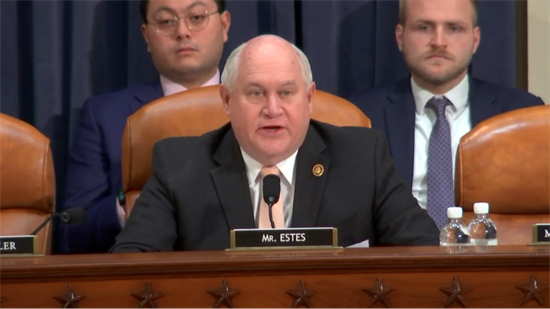Rep. Estes Delivers Remarks on Protecting U.S. Trade Priorities
Washington,
February 8, 2024
|
Roman Rodriguez
(316-262-8992)
Yesterday, Rep. Ron Estes (R-Kansas) delivered remarks condemning the abandonment of U.S. digital trade priorities by the U.S. Trade Representative (USTR) at the World Trade Organization during a Ways and Means Trade Subcommittee hearing. Under the Biden administration, the USTR and the U.S. Treasury have pursued damaging proposals that undermine U.S. sovereignty and hurt our tax base.
Rep. Estes has consistently denounced the Biden administration’s acquiescence to policies at the international level that disadvantage the United States. In the last few months he published an op-ed with MP Priti Patel on the OECD Pillar Two Tax Scheme, led a letter to Treasury demanding accountability and travelled with Ways and Means colleague to Germany and France to discuss Pillar Two with European leaders. You can read the remarks below. Watch Rep. Estes' remarks here.
Full Remarks: Thank you, Mr. Chairman, and thank you to our distinguished panel for joining us today. I’m glad you and my colleagues touched on the disastrous precedent set by the TRIPS waiver. It is ridiculous that our current administration is willing to allow other countries to steal the intellectual property of American businesses. I want to touch on this as well, but from the broader perspective of U.S. R&D competitiveness and the tax consequences of forced technology transfers, localized operations, and data localization. Intellectual property is the direct result of research and development. Our current tax system has incentivized the execution of R&D in several ways. The first is the immediate R&D expensing, which we will hopefully get over the finish line in the Senate soon with the bill that we just passed the House last week. This is complemented by an R&D tax credit that is especially useful to small and medium-sized businesses that engage in cutting-edge research. Additionally, our global tax system contains the Foreign-Derived Intangible Income (FDII) deduction, that rewards companies for domiciling IP in the U.S. As strong as these incentives are, I believe that the administration’s active participation in IP theft is a massive disincentive for American businesses to conduct R&D here. The TRIPS waiver has put us on a slippery slope. We now have countries at the WTO proposing more tech transfers, localized operations, and data localization – in short, the complete abandonment of U.S. digital trade priorities. Ms. Shaw, what do you believe the overall effects on the U.S. economy and research and development if the administration fails to oppose foreign government demands on localization? Witness response. This concerns me, not just from a trade perspective, but from a tax perspective as well. On the surface, these proposals may result in U.S. companies having permanent establishments in foreign countries, ceding primary taxing rights to those countries, causing jobs to migrate away from the United States and decreasing payroll taxes remitted to the U.S. Treasury. However, what is most alarming to me is the interaction of these WTO policies with our global tax system and OECD’s Pillar Two. When we addressed international tax in the Tax Cuts and Jobs Act in 2017, we created the FDII and GILTI regimes, which basically function as a carrot and a stick: if you have IP in the U.S. and sell overseas, those profits are taxed at a lower rate; if you have IP overseas, those profits are taxed at a higher rate. This system has been successful in bringing IP back to the United States and stopping corporate inversion. However, the success of this system relies on the U.S. retaining primary taxing rights on IP within the U.S. As many of my colleagues know, I have been adamant in my opposition to OECD’s Pillar Two for a variety of reasons. In relation to this topic, what concerns me the most is the qualified domestic minimum top-up tax (QDMTT). A QDMTT would be assessed by foreign countries on U.S. companies with a physical presence in that country, if it is determined that the company’s effective tax rate is under 15%. Due to OECD’s ordering rules, and U.S. Treasury not defending our tax system, QDMTTs are given priority over GILTI and FDII. Any QDMTT paid by a U.S. company would generate a foreign tax credit, which would be an additional drain on the U.S. Treasury. With this additional information, Ambassador Shea, what do you think would be the overall effects on the U.S. tax base and will U.S. tax receipts be increased or decreased? Witness response. This has an impact on our trade just because of the way its discussed and the work that you’ve done on the WTO has been so beneficial in highlighting the weaknesses there. In summary, we need to have the USTR focus on policies that are beneficial for the United States and utilizing what the WTO was originally crafted to be to help us in international trade. Thank you, I yield back. |








